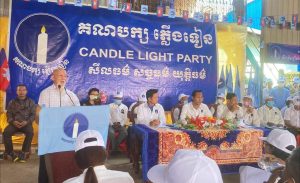Next month, Cambodia will hold elections for its 1,652 communes and sangkats, an event that normally foreshadows the result of the national elections held the following year. The June 5 polls will see about 9.2 million registered voters elect the chief and councilors from among more than 80,000 candidates belonging to 17 political parties.
But barring “genuine efforts toward democratization and political reform” by the the Cambodian People’s Party (CPP)-controlled government, the election is likely to fall far short of being “fair, credible, transparent, inclusive, and peaceful,” the Asian Network for Free Elections (ANFREL) said in a pre-election analysis of the country’s political landscape and legal framework.
The analysis, based on more than 60 interviews with electoral stakeholders including representatives of civil society groups, political parties, the media, labor unions, academia, the diplomatic community, and international organizations, found that political repression and a restrictive legal framework have narrowed the country’s political space since the last commune elections in 2017.
“Overall, Cambodia still falls short of the standard of democratic elections according to ANFREL’s Dili Indicator for Democratic Elections,” the report concluded. “There will be no genuine and legitimate election outcome as long as threats against the opposition and civic society remain prevalent.”
The reasons adduced by ANFREL include the effective control by the CPP of the National Election Committee and other key state bodies and institutions; the sustained crackdowns on the political opposition, civil society groups, activists, and the independent media; and the CPP’s intimidation of opposition parties seeking to run in the upcoming elections. While the June 5 poll will involve more parties than participated in the last election in 2017, “many opposition candidates and members… continue to experience harassment and intimidation on the ground,” the report found.
None of this will come as much surprise to anyone who has paid even glancing attention to Cambodia’s politics over the past six years, a period that has seen the CPP and its leader, Prime Minister Hun Sen, do away with most of the pretense of multiparty democracy that they were pushed to adopt in the early 1990s.
In late 2017, a CPP-controlled court outlawed the popular Cambodia National Rescue Party (CNRP), which had managed to win 43.8 percent of the popular vote at the last commune election in June 2017, threatening the CPP’s hold on the political grassroots. This drove most of the party’s senior leadership into exile, left the CPP to run virtually unopposed in the 2018 national election, where it won every seat in the National Assembly. Meanwhile, the party’s former leader Kem Sokha was arrested on charges of treason and imprisoned; his trial remains ongoing.
In this context, the result of the commune election would seem to be a foregone conclusion. The CPP is the only party running candidates in every commune, and goes into the election with complete control over the apparatus of the state. The one party that might make significant gains is the Candlelight Party (CP), the latest political party associated with long-time opposition figure Sam Rainsy, who has been living in exile since late 2015. It is also the successor to his Sam Rainsy Party, one of two opposition parties that merged to form the CNRP in 2012.
The CP is fielding the second-highest number of candidates in the election after the CPP, positioning itself to capture the votes that once went to the CNRP. But as the ANFREL report makes clear, most of the harassment and intimidation that have been reported by the CP have been directed against the CP, making clear that the CPP’s tolerance for the newly activated party will only persist as long as the party does not pose a direct challenge to its power.
Given the pre-scripted and acclamatory nature of the June 5 election, a more consequential thing to watch is the reaction of Western governments. Following the one-horse race of 2018, the European Union partially suspended Cambodia’s tariff-free access that it enjoys under the bloc’s Everything But Arms scheme.
The United States has also used democratic backsliding as a pretext to impose a range of targeted sanctions on important Hun Sen cronies and to threaten to reassess the trade preferences that Cambodia enjoys under the GSP, though in practice it is much more exercised about the country’s growing closeness with China.
There are some indications that another non-competitive election could push Western nations to take more robust action against the Cambodian government. On May 5, the European Parliament adopted a resolution calling on Hun Sen and his administration to cease its persecution and intimidation of political opponents, trade unionists, human rights defenders, and journalists ahead of next month’s commune elections and the national elections due in 2023. The resolution suggested that the European Commission should be “prepared to use all tools available, including a complete suspension of Cambodia’s ‘Everything But Arms’ status and other sanctions, if electoral observers find evidence of unfair elections.”
While Cambodia remains reliant on Western markets for its exports, particularly its apparel and footwear, history suggests that the government is unlikely to bend to pressure from Brussels and Washington, and that any concessions that it makes will be partial and easily reversible. Unsurprisingly, the Cambodian National Assembly responded to the European Parliament’s resolution with a statement denouncing it as “misleading, biased, politicized, one-sided, and totally disrespectful of a sovereign state.”

































